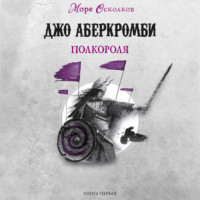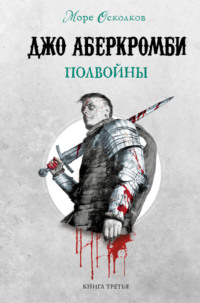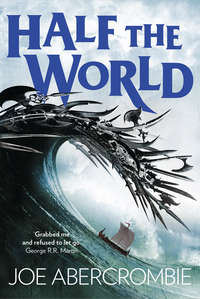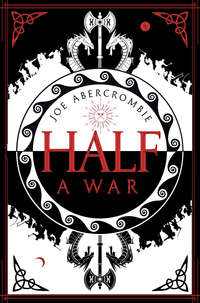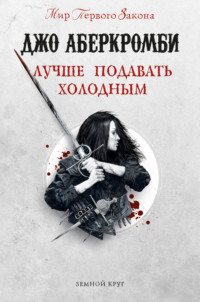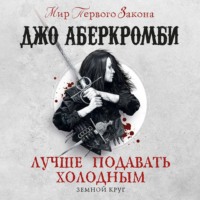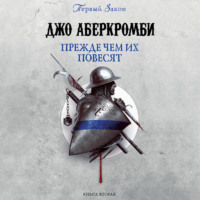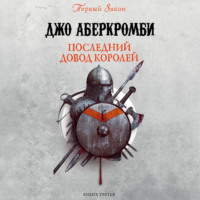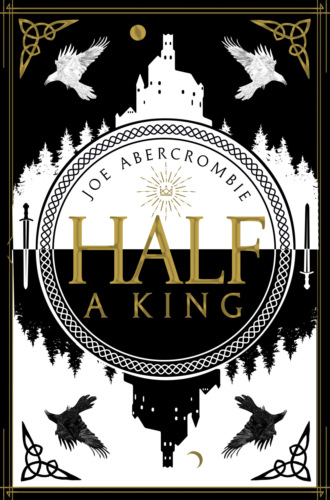
Полная версия
Half a King
He had always been weak, but he never felt truly powerless until they made him a king.
He heard shuffling feet on the steps and Mother Gundring ducked through the low doorway, breathing hard.
‘I thought you’d never get here,’ said Yarvi.
‘My king,’ replied the old minister once she had the breath. ‘You were expected before the Godshall.’
‘Aren’t the tunnels meant for a king’s escape?’
‘From armed enemies. From your family, your subjects, not to mention your bride-to-be, less so.’ She peered up at the domed ceiling, at the gods painted there as birds, taking to a brilliant sky. ‘Were you planning to fly away?’
‘To Catalia, perhaps, or the land of the Alyuks, or up the Divine River to Kalyiv.’ Yarvi shrugged. ‘But I don’t have two good hands, never mind two good wings.’
Mother Gundring nodded. ‘In the end, we must all be what we are.’
‘And what am I?’
‘The King of Gettland.’
He swallowed then, knowing how disappointed she must be. How disappointed he was himself. In the songs great kings rarely crawled off to hide from their own people. He caught sight of the eagle as he looked away, huge and serene in its cage.
‘Grandmother Wexen has sent a message?’
‘A message,’ echoed one of the doves in its scratching mockery of a voice. ‘A message. A message.’
Mother Gundring frowned up at the eagle, still as a stuffed trophy. ‘It came from Skekenhouse five days ago. Grandmother Wexen sent to ask when you would arrive for your test.’
Yarvi remembered the one time he had seen the First of Ministers, a few years before when the High King had visited Thorlby. The High King had seemed a grim and grasping old man, offended by everything. Yarvi’s mother had been obliged to soothe him when someone did not bow in quite the manner he liked. Yarvi’s brother had laughed that such a feeble little wisp-haired man should rule the Shattered Sea, but his laughter died when he saw the number of warriors that followed him. Yarvi’s father had raged because the High King took gifts and gave none. Mother Gundring had clicked her tongue and said, The wealthier a man is, the more he craves wealth.
Grandmother Wexen had scarcely left her proper place at the High King’s side, ever smiling like a kindly grandparent. When Yarvi knelt before her she had looked at his crippled hand, and leaned down to murmur, My prince, have you considered joining the Ministry? And for a moment he had seen a hungry brightness in her eye which scared him more than all the High King’s frowning warriors.
‘So much interest from the First of Ministers?’ he muttered, swallowing an aftertaste of that day’s fear.
Mother Gundring shrugged. ‘It is rare to have a prince of royal blood join the Ministry.’
‘No doubt she’ll be as disappointed as everyone else that I’ve taken the Black Chair instead.’
‘Grandmother Wexen is wise enough to make the best of what the gods serve her. As must we all.’
Yarvi’s eyes slid across the rest of the cages, seeking a distraction. Pitiless though they were, the eyes of the birds were easier to bear than those of his disappointed subjects.
‘Which dove brought the message from Grom-gil-Gorm?’
‘I sent it back to Vansterland. To his minister, Mother Scaer, carrying your father’s agreement to a parley.’
‘Where was the meeting to be?’
‘On the border, near the town of Amwend. Your father never reached the place.’
‘He was ambushed in Gettland?’
‘So it appears.’
‘It does not seem like my father, to be so keen to end a war.’
‘War,’ croaked one of the doves. ‘End a war.’
Mother Gundring frowned at the grey-spattered floor. ‘I counselled him to go. The High King has asked for all swords to be sheathed until his new temple to the One God is completed. I never suspected even a savage like Grom-gil-Gorm would betray the sacred word given.’ She made a fist, as though she would strike herself, then slowly let it uncurl. ‘It is a minister’s task to smooth the way for Father Peace.’
‘But had my father no men with him? Had he—’
‘My king.’ Mother Gundring looked at him from under her brows. ‘We must go down.’
Yarvi swallowed, his stomach seeming to jump up his throat and wash his mouth with sour spit. ‘I’m not ready.’
‘No one ever is. Your father was not.’
Yarvi made a sound then, half a laugh, half a sob, and wiped tears on the back of his crooked hand. ‘Did my father weep after he was betrothed to my mother?’
‘In fact, he did,’ said Mother Gundring. ‘For several years. She, on the other hand …’
And Yarvi gurgled up a laugh despite himself. ‘My mother’s even meaner with her tears than her gold.’ He looked up at the woman who had been his teacher, would now be his minister, that face full of kindly lines, the bright eyes filled with concern, and found he had whispered, ‘You’ve been like a mother to me.’
‘And you like a son to me. I am sorry, Yarvi. I am sorry for everything but … this is the greater good.’
‘The lesser evil.’ Yarvi fussed at his stub of a finger, and blinked up at the birds. The many doves, and the one great eagle. ‘Who will feed them now?’
‘I will find someone.’ And Mother Gundring offered her bony hand to help him up. ‘My king.’
PROMISES
It was a great affair.
Many powerful families in the far reaches of Gettland would be angered that news of King Uthrik’s death had barely reached them before he was burned, denying them the chance to have their importance noted at an event that would live so long in the memory.
No doubt the all-powerful High King on his high chair in Skekenhouse, not to mention the all-knowing Grandmother Wexen at his elbow, would be far from delighted that they received no invitation, as Mother Gundring was keen to point out. But Yarvi’s mother forced through her clenched teeth, ‘Their anger is dust to me.’ Laithlin might have been queen no longer but no other word would fit her, and Hurik still hovered huge and silent at her shoulder, sworn forever to her service. Once she spoke it was a thing already done.
The procession passed from the Godshall through the yard of the citadel, grass littered with the sites of Yarvi’s many failures, under the limbs of the great cedar his brother used to mock him for being unable to climb.
Yarvi went at the fore, of course, his mother overshadowing him in every sense at his shoulder and Mother Gundring struggling to keep up behind, bent over her staff. Uncle Odem led the king’s household, warriors and women in their best. Slaves came behind, collars rattling and their eyes on the ground where they belonged.
Yarvi glanced up nervously as they passed through the one entrance tunnel, saw the bottom edge of the Screaming Gate gleam in the darkness, ready to drop and seal the citadel against any enemy. It was said to have been let fall only once, and that long before he was born, but still he swallowed as he always did when he passed beneath it. A mountain’s weight of polished copper hanging by a single pin tended to rattle the nerves.
Especially when you were about to burn half your family.
‘You’re doing well,’ Yarvi’s uncle whispered in his ear.
‘I am walking.’
‘You are walking like a king.’
‘I am a king and I am walking. How could it be otherwise?’
Odem smiled at that. ‘Well said. My king.’
Over his uncle’s shoulder Yarvi caught Isriun smiling at him too, the torch she carried setting a gleam to her eyes and the chain about her neck. Soon the key to the treasury of Gettland would hang upon it, and she would be queen. His queen, and the thought gave him hope amidst his fears like a spark in the darkness.
They all carried torches, a snake of lights through the gathering gloom, though the wind had snatched out half the flames by the time the procession passed through the city’s gates and onto the bare hillside.
The king’s own ship, the best in Thorlby’s crowded harbour, twenty oars upon a side and its high prow and tail carved as finely as anything in the Godshall, was dragged by honoured warriors to the chosen place among the dunes, keel grinding out a snaking trench in the sand. The same ship in which King Uthrik had sailed across the Shattered Sea on his famous raid to Sagenmark. The same ship which had wallowed low in the water with slaves and plunder when he returned in triumph.
On its deck they laid the pale bodies of the king and his heir upon a bier of fine swords, for Uthrik’s fame as a warrior had stood second only to his dead brother Uthil’s. All Yarvi could think was how that showed great warriors die no better than other men.
And usually sooner.
Rich offerings were placed about the dead in the manner the prayer-weaver judged the gods would most appreciate. Weapons and armour the king had won in battle. Armrings of gold, coins of silver. Treasures heaped glittering. Yarvi put a jewelled cup in his brother’s fists, and his mother put a cloak of white fur over the dead king’s shoulders, and placed one hand upon his chest, and stood looking down, her jaw clenched tight, until Yarvi said, ‘Mother?’
She turned without a word and led him to the chairs on the hillside, the sea wind catching the brown grass and setting it thrashing about their feet. Yarvi squirmed for a comfortable position in that hard, high seat, his mother motionless on his right with Hurik a huge shadow behind her, Mother Gundring perched on a stool at his left hand, her staff clutched in one bony fist, the twisted elf-metal alive with reflected flames from the rustling torches.
Yarvi sat between his two mothers. One who believed in him. One who had given birth to him.
Mother Gundring leaned close then and said softly, ‘I am sorry, my king. This is not what I wanted for you.’
Yarvi could show no weakness now. ‘We must make the best of what the gods serve us,’ he said. ‘Even kings.’
‘Especially kings,’ grated out his mother, and gave the signal.
Two dozen horses were led onto the ship, hooves clattering at the timbers, and slaughtered so their blood washed the deck. All agreed Death would show King Uthrik and his son through the Last Door with respect, and they would be acknowledged great among the dead.
Uncle Odem stepped out before the ranks of battle-ready warriors massed upon the sand, a torch in one hand. With his silvered mail and winged helm and red cloak snapping he looked like a son, and brother, and uncle of kings indeed. He nodded solemnly to Yarvi, and Yarvi nodded back, and he felt his mother clutch his right hand and squeeze it hard.
Odem set the torch to the pitch-soaked kindling. The flames licked about the ship and in a moment it was all ablaze, a sorrowful moan drawn from the crowds – from the honoured and wealthy upon the high terraces before the walls of Thorlby, the crafters and merchants below them, the foreigners and peasants below them, the beggars and slaves scattered in whatever crevices the wind allowed them, each person in the place the gods had reckoned proper.
And Yarvi had to swallow, because he realized of a sudden that his father would never come back and he truly would have to be king, from now until he was burned himself.
He sat there, cold and sickly, a drawn sword across his knees, as Father Moon showed himself and his children the stars came out, and the flames of the burning ship, and the burning goods, and his burning family lit up the faces of the hundred hundred mourners. As scattered lights showed in the stone buildings of the city, and the wattle hovels huddled outside the walls, and in the towers of the citadel upon the hill. His citadel, although to him it had always had the look of a prison.
It took a hero’s struggle to stay awake. He had barely slept last night, or any night since they put the King’s Circle on him. The shadows in the cold depths of his father’s yawning bedchamber seemed crowded with fears, and by ancient tradition there was no door he could bolt since the King of Gettland is one with the land and the people and must hide nothing from them.
Secrets, and bedroom doors, were luxuries reserved for luckier folk than kings.
A queue of proud men in their war-gear and proud women with keys polished, some of them sore trouble to King Uthrik while he lived, filed past Yarvi and his mother to wring their hands, and press gaudy grave gifts on them, and speak in swollen terms of the dead lord’s high deeds. They lamented that Gettland would never see his like again, then remembered themselves and bowed and mouthed ‘my king’ while behind their smiles no doubt they wondered how it might be made to profit them to have this one-handed weakling in the Black Chair.
Only the occasional hiss passed between Yarvi and his mother. ‘Sit up. You are a king. Do not apologize. You are a king. Straighten your cloak-buckle. You are a king. You are a king. You are a king.’ As if she was trying to convince him, and herself, and the world of it against all the evidence.
Surely the Shattered Sea had never seen so cunning a merchant, but he doubted even she could sell this.
They sat until the flames sank to a flickering, and the dragon-carved keel sagged into whirling embers, and the first muddy smear of dawn touched the clouds, glittering on the copper dome of the Godshall and setting the sea-birds calling. Then his mother clapped her hands and the slaves with clinking collar-chains began to dig the earth over the still-smouldering pyre, raising a great howe that would stand tall beside that of Yarvi’s uncle Uthil, swallowed in a storm, and his grandfather Brevaer, and his great-grandfather Angulf Clovenfoot. On down the coast marched the grassy humps until they were lost among the dunes, diminishing into the fog of time before She Who Writes entrusted woman with the gift of letters, and ministers trapped the names of the dead in their high books.
Then Mother Sun showed her blinding face and put fire upon the water. The tide would soon be draining, carrying with it the many ships drawn up upon the sand, sharp-tailed so they could slip away as swiftly as they arrived, ready to sweep the warriors to Vansterland to rip their vengeance from Grom-gil-Gorm.
Uncle Odem climbed the hill with fist firm on sword’s hilt and his easy smile traded for a warrior’s frown.
‘It is time,’ he said.
So Yarvi stood, and stepped past his uncle, and held high his borrowed sword, swallowing his fears and roaring into the wind as loud as he could. ‘I, Yarvi, son of Uthrik and Laithlin, King of Gettland, swear an oath! I swear a sun-oath and a moon-oath. I swear it before She Who Judges, and He Who Remembers, and She Who Makes Fast the Knot. Let my brother and my father and my ancestors buried here bear witness. Let He Who Watches and She Who Writes bear witness. Let all of you bear witness. Let it be a chain upon me and a goad within me. I will be revenged upon the killers of my father and my brother. This I swear!’
The gathered warriors clashed the bearded heads of their axes against their helms, and their fists against their painted shields, and their boots against Father Earth in grim approval.
Yarvi’s uncle frowned. ‘That is a heavy oath, my king.’
‘I may be half a man,’ said Yarvi, struggling to get his sword back into its sheepskin-lined sheath. ‘But I can swear a whole oath. The men appreciated it, at least.’
‘These are men of Gettland,’ said Hurik. ‘They appreciate deeds.’
‘I thought it was a fine oath.’ Isriun stood near, yellow hair streaming in the wind. ‘A kingly oath.’
Yarvi found he was very glad to see her there. He wished no one else had been, then he could have kissed her again, and probably made a better effort at it. But all he could do was smile, and half-raise his half-hand in an awkward farewell.
There would be time for kisses when they next met.
‘My king.’ It seemed Mother Gundring’s eyes, forever dry in any smoke or dust or weather, held tears. ‘May the gods send you fine weatherluck, and even better weaponluck.’
‘Don’t worry, my minister,’ he said, ‘there’s always the chance I’ll survive.’
His true mother shed no tears. All she did was fasten his twisted cloak-buckle yet again and say, ‘Stand like a king, Yarvi. Speak like a king. Fight like a king.’
‘I am a king,’ he said, however much of a lie it felt, and he forced through his tightened throat, ‘I’ll make you proud,’ even though he had never known how.
But he looked back, as he walked with his uncle’s gently steering hand upon his shoulder, the warriors forming snakes of glimmering steel as they filed towards the water, and he saw his mother clutch Hurik by his mail and drag him close, strong man though he was.
‘Watch over my son, Hurik,’ he heard her say in a choking voice. ‘He is all I have.’
Then the Golden Queen was gone with her guards and attendants and her many slaves towards the city, and Yarvi was striding through the colourless dawn towards the ships, their masts a swaying forest against the bruising sky. Trying to walk the way his father used to, eager for the fight, even though he was weak-kneed, and sore-throated, and red-eyed, and his heart was crowded with doubts. He could still smell the smoke.
He left Father Peace to weep among the ashes, and hastened to the iron embrace of Mother War.
MAN’S WORK
Each wave born of Mother Sea would lift him, roll him, tug his sodden clothes, make him twitch and stir as if struggling to rise. Each wave hissed back out would drag the body down the beach and leave it grounded, tangled hair stuck with froth and sand, limp as the knots of seaweed on the shingle.
Yarvi stared at him, wondering who he was. Or had been. Boy or man? Had he died running or fought bravely?
What was the difference now?
The keel ground against sand, the deck shuddered, Yarvi stumbled and had to clutch at Hurik’s arm to steady himself. With a clunk and clatter the men unshipped their oars, unhooked their shields, and sprang over the ship’s sides into the surf, sullen at being last to land, too late for any glory or plunder worth the taking. Crewing the king’s ship would have been a high honour in King Uthrik’s reign.
No honour at all in King Yarvi’s.
Some men took the prow-rope and hauled the ship past the floating corpse and higher up the beach, others unslung their weapons and hurried towards the town of Amwend. It was already burning.
Yarvi chewed at his lip as he made ready to clamber over the side with some shred of kingly composure, but the handle of his gilded shield twisted in his weakling’s grip, tangled with his cloak and nearly dumped him face-first in the brine.
‘Gods damn this thing!’ Yarvi tugged the straps loose, dragged the shield from his withered arm and flung it away among the sea-chests the men sat on while they rowed.
‘My king,’ said Keimdal. ‘You should keep your shield. It’s not safe—’
‘You’ve fought me. You know what my shield’s worth. If someone comes at me I can’t stop with sword alone I’m better off running. I’ll run faster without my shield.’
‘But, my king—’
‘He is king,’ rumbled Hurik, pushing his thick fingers through his white-streaked beard. ‘If he says we all put aside our shields, it must be so.’
‘Those with two good hands are welcome to theirs,’ said Yarvi, slithering into the surf, cursing as another cold wave soaked him to the waist.
Where sand gave way to grass some new-made slaves were roped together, waiting to be herded aboard one of the ships. They were hunched and soot-smeared, wide eyes full of fear or pain or disbelief at what had surged from the sea and stolen their lives. Beside them, a group of Yarvi’s warriors diced for their clothes.
‘Your Uncle Odem asks for you, my king,’ said one, then got up frowning and kicked a sobbing old man onto his face.
‘Where?’ asked Yarvi, his tongue sticking in his mouth, it was suddenly so dry.
‘On top of the holdfast.’ The man pointed up towards a drystone tower on a sheer rock above the town, waves angry about its base on one side, a frothing inlet on the other.
‘They didn’t close the gates?’ asked Keimdal.
‘They did, but three of the headman’s sons were left in the town, and Odem slit one’s throat and said he’d kill the next if the gate wasn’t opened.’
‘It was,’ said one of the other warriors, then chuckled as his number came up. ‘New socks!’
Yarvi blinked. He had never thought of his smiling uncle as a ruthless man. But Odem had sprouted from the same seed as Yarvi’s father, whose rages he still carried the marks of, and their drowned brother Uthil, at the memory of whose peerless swordsmanship old warriors in the training square still came over dewy-eyed. Sometimes calm waters hide fierce currents, after all.
‘A curse on you!’
A woman had tottered from the line of slaves as far as the ropes would allow, bloody hair plastered against one side of her face.
‘Bastard king of a bastard country, may Mother Sea swallow—’
One of the warriors cuffed her to the ground.
‘Cut her tongue out,’ said another, jerking her back by her hair while a third drew a knife.
‘No!’ shouted Yarvi. The men frowned at him. If their king’s honour was questioned so was theirs, and mercy would not do as an explanation. ‘She’ll fetch a better price with her tongue.’ And Yarvi turned away, shoulders chafing under the weight of his mail, and struggled on towards the holdfast.
‘You are your mother’s son, my king,’ said Hurik.
‘Who else’s would I be?’
His father’s eyes and his brother’s used to glow as they told tales of past raids, of great deeds done and grand prizes taken, while Yarvi lurked in the shadows at the foot of the table and wished he could have taken a man’s part in the man’s work. But here was the truth of it, and a place on a raid did not seem enviable now.
The fighting was over, if there had been any worthy of the name, but still it seemed Yarvi laboured through a nightmare, sweating in his mail and chewing at the inside of his mouth and startling at sounds. Screams and laughter, figures darting through the wriggling haze of fires, smoke scratching at his throat. Crows pecked and circled and cawed their triumph. Theirs was the victory, most of all. Mother War, Mother of Crows, who gathers the dead and makes the open hand a fist, would dance today, while Father Peace hid his face and wept. Here, near the shiftless border between Vansterland and Gettland, Father Peace wept often.
The tower of the holdfast loomed black above them, the noise of waves crashing on both sides of its foundations loud below.
‘Stop,’ said Yarvi, breathing hard, head spinning, face tickling with sweat. ‘Help me out of my mail.’
‘My king,’ frothed Keimdal, ‘I must object!’
‘Object if you please. Then do as I tell you.’
‘It’s my duty to keep you safe—’
‘Then imagine your dishonour when I die of too much sweating halfway up this tower! Undo the buckles, Hurik.’
‘My king.’ They stripped his mail shirt off and Hurik threw it over one great shoulder.
‘Lead on,’ Yarvi snapped at Keimdal, struggling to fasten his father’s clumsy golden cloak-buckle with his useless lump of a hand, too big and too heavy for him by far and the hinge all stiff as—
He was stopped dead by the sight that greeted them beyond the open gates.
‘Here is a harvest,’ said Hurik.
The narrow space in front of the tower was scattered with bodies. So many that Yarvi had to search for patches of ground between to put his feet. There were women there, and children. Flies buzzed, and he felt the sickness rising, and fought it down.
He was a king, after all, and a king rejoices in the corpses of his enemies.
One of his uncle’s warriors sat beside the entrance to the tower, cleaning his axe as calmly as he might have beside the training square at home.
‘Where is Odem?’ Yarvi muttered at him.
The man gave a squint-eyed grin and pointed upwards. ‘Above, my king.’


